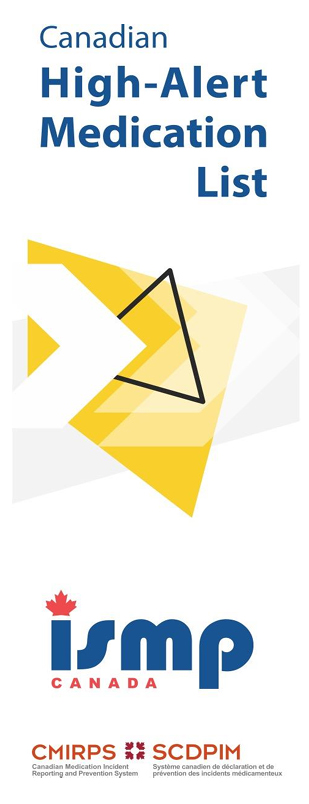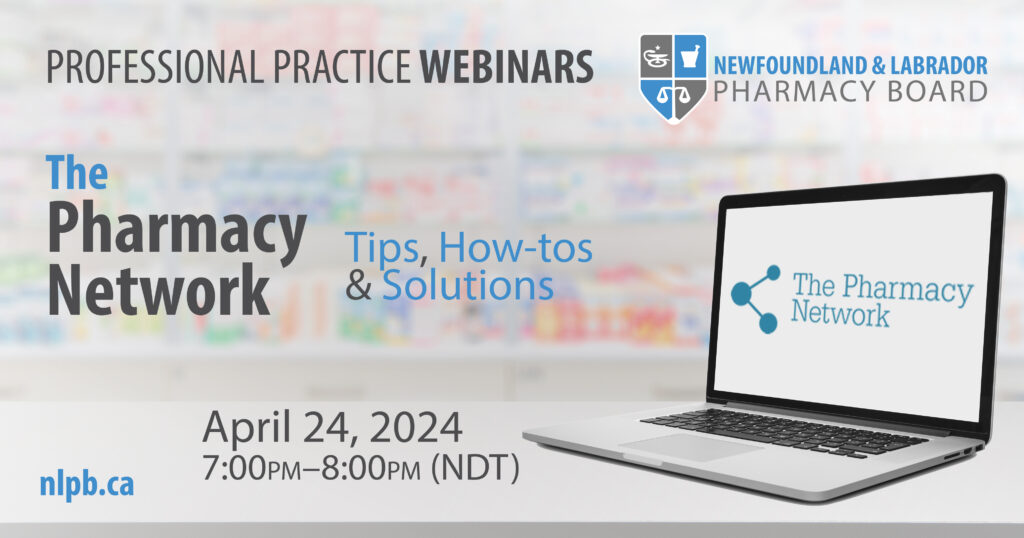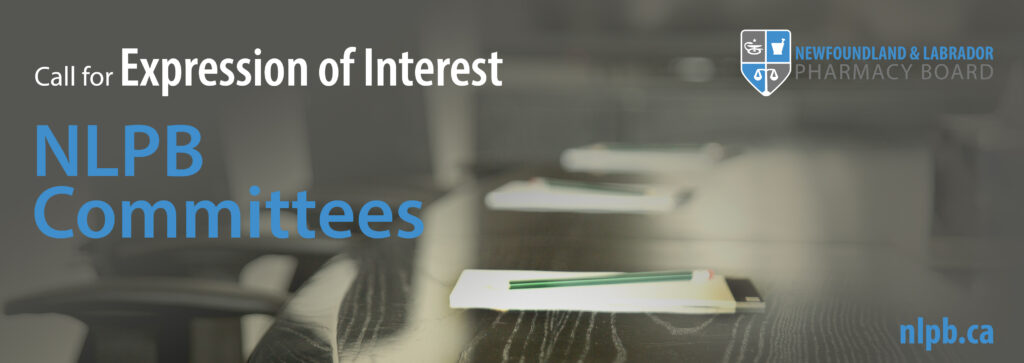The next implementation deadline for the MedSTEP NL program is to choose a reporting platform to export data to the National Incident Data Repository (NIDR) by March 31, 2024.
Pharmacists-in-charge must ensure the pharmacy is subscribed to an MIR platform that meets the MedSTEP NL criteria before signing and submitting a data-sharing agreement with the National Incident Data Repository (NIDR), which must be completed by the end of March. At this time, ISMP Canada has reported that less than 60% of community pharmacies in NL have signed a data-sharing agreement with the NIDR.
Please review the steps below that must be completed by the implementation deadline:
To complete this implementation step, community pharmacies must ensure the following:
- Pharmacist-in-charge (PIC) reviews and understands MedSTEP NL criteria for a MIR platform.
- PIC either:
- subscribes to a MIR platform that meets MedSTEP NL criteria; or
- ensures existing or in-house MIR platform meets MedSTEP NL criteria.
- PIC signs and submits a data-sharing agreement with NIDR.
- PIC obtains a Medication Safety Self-Assessment tool included in the chosen reporting platform or from another source.
- PIC completes the pharmacy policies and procedures manual for MedSTEP NL
- Pharmacy staff, including pharmacists, pharmacy technicians, and pharmacy assistants, review and understand the policies and procedures for MedSTEP NL
NEW Standards for the Provision of Opioid Agonist Therapy Medications
The new Standards for the Provision of Opioid Agonist Therapy Medications were approved by the NLPB board of directors at their March 2024 meeting. These standards replace the former Standards for the Safe and Effective Provision of Opioid Agonist Maintenance Treatment (2018).
These new standards are the result of a combination of background research, subject matter expertise, jurisdictional scans, and feedback from both a task force consisting of pharmacy professionals and board members and an external consultation that was conducted in the Fall of 2023. The Standard of Practice is now posted on the NLPB website with an implementation deadline of no later than July 1, 2024.
Some highlights of changes from the previous version of the standards include:
- In the interests of reducing barriers to care and stigma, pharmacists and pharmacists-in-charge are no longer required to become authorized to participate in or offer opioid agonist treatment (OAT) services. Pharmacy professionals are still expected to gain and maintain the necessary knowledge and skills, as identified in section 4, and pharmacies must still meet the operational standards identified in section 5 prior to participating in OAT.
- References specific to releasing doses of medications and witnessing patient self-administration have been revised to distinguish between the clinical and technical aspects of these activities and allow for a pharmacist to delegate the actual witnessing of the self-administration of a witnessed dose (section 6.7 b)) or the provision of take-home doses to the patient (section 6.8 b)) to a pharmacy technician.
- References to the Health Canada subsection 56(1) class exemption specific to prescription transfers and pharmacist prescribing have been added (section 8.4).
- New sections have been added specific to ethical considerations, including principles of stigma, trauma-informed care, and harm reduction (section 2).
Requirements for the Delegation of Administration of Injections and Inhalations
Pharmacists and pharmacy technicians who wish to participate in the administration of inhalations or injections must apply to NLPB for authorization through the NLPB Registrant Portal.
As per the updated Standards of Practice for the Administration of Drug Therapy by Inhalation or Injection, pharmacists who assess the patient to determine the appropriateness of treatment and choose to delegate the administration of the drug therapy by injection or inhalation to a pharmacy technician, pharmacy intern, or student must themselves be authorized by NLPB.
Pharmacy technicians, pharmacy interns and pharmacy students may only administer drug therapy by inhalation or injection when an authorized pharmacist has assessed the patient and determined that the administration of the drug therapy is appropriate, and when they are being provided with appropriate oversight and clinical support. (Section 3)b))
In situations where a pharmacy technician administers drug therapy, an authorized pharmacist must be present in the pharmacy or other place where the administration is taking place to provide appropriate oversight and/or clinical support, as required. (Section 4) e) ii))
Welcoming Beth McGrath
Update on Annual Professional Development Audit
As per the notification pharmacy professionals received at the end of January, NLPB is reassessing the professional development audit process. At the recent meeting of the NLPB Board of Directors in March, a decision was made not to conduct a professional development audit in 2024. This will enable the Professional Development Committee and NLPB staff to prioritize the review of audit processes and current professional development activities.
NLPB has partnered with NL Health Services to present The Pharmacy Network: Tips, How-tos, and Solutions on Wednesday, April 24, 2024, 7:00-8:00 pm (NDT).
In this webinar, Richard Coombs, Program Manager – Pharmacy Network, Digital Health, NL Health Services, will offer tips to pharmacy professionals for using the Pharmacy Network to its full potential, discuss trends in pharmacy identified through data analysis, and suggest ways that pharmacy professionals can improve data collection to help inform healthcare decision making.
Topics will include:
- Dispense Pickups
- Prescription Transfers
- Client Registry Searches
- Immunizations
- Prescription Monitoring Program
Date: April 24, 2024
Time: 7:00-8:00 pm (NDT)
Presenter: Richard Coombs, Program Manager – Pharmacy Network, Digital Health, NL Health Services
This webinar will be hosted through Microsoft Teams.
Calls for Expressions of Interest
NLPB is currently seeking a hospital pharmacist to join the Quality Assurance Committee and both a community pharmacist and a hospital pharmacist to join the Pharmacy Practice Advisory Committee.
For more information about these opportunities, please visit our website:
If you are interested in serving on either of these committees, please submit your name, contact information, a brief bio, and a few lines about why you are interested in being part of the committee to inforx@nlpb.ca.
ISMP High-Alert Medications List
 |
The Institute for Safe Medication Practices (ISMP) Canada has developed a Canadian High-Alert Medication List to support the identification of drugs that bear a heightened risk of causing significant harm when used in error and may require additional safeguards to reduce the risk of errors and patient harm.
The list was developed with pan-Canadian collaboration, recognizing the contextual differences between lists from other countries, and seeks to affirm and validate currently recognized high-alert medications in the Canadian context. The list applies to all healthcare settings and is intended to assist organizations in developing their own organization-specific high-alert medication list. More information can be found in the February edition of the ISMP Canada Safety Bulletin and the accompanying user guide. |
Regular reminders
- Registrant Contact Information – Registrants are responsible for ensuring that the contact information on their registrant profile, including email address and practice site, is accurate at all times. The NLPB primarily uses email communication to send newsletters, renewal reminders, practice site assessment information, professional development audit information, calls for interest for committees, and other alerts. If the email address on file is incorrect, important information may be missed and/or disclosed to the wrong person. If your contact information changes, please update your information on file by logging into the NLPB Registrant Portal.
- Application Submission – NLPB receives many applications for processing. Unfortunately, some of the applications submitted are illegible, incomplete, or missing supporting documentation or payment, leading to delays in processing and approving the application. In order to ensure that your application is processed in a timely manner, please take a moment before submission to ensure that all fields are completed and legible and that all supporting documentation is included. All supporting documentation should adhere to NLPB’s Scanning Guidelines and Checklist for Document Submissions Policy. These small steps will help improve the process for both the applicant and NLPB.
This e-newsletter contains information on a wide variety of topics intended to enhance the practice of pharmacy in the province of Newfoundland and Labrador. As it is published and circulated to all registrants on a monthly basis, it is the expectation of NLPB that all registrants are aware of the matters contained therein.




